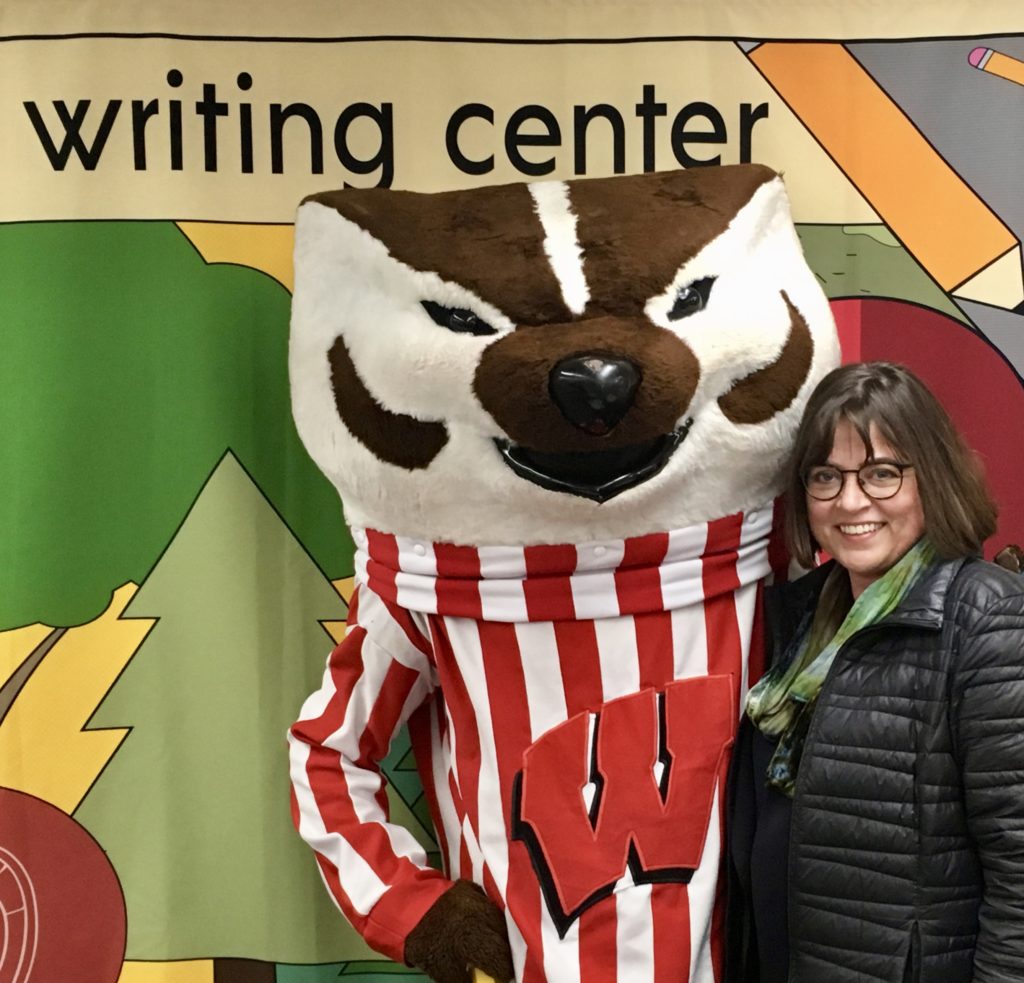Notes delivered on the occasion of the Writing Center’s 50th Anniversary Celebration, Nov. 8, 2019

Dear colleagues, students, Dean Wilcots, friends and supporters of the Writing Center!
It is my great pleasure to welcome you to this celebration of the 50th anniversary of the Writing Center. That’s 50 years of developing, sharing, and shaping the field of writing pedagogy, with 35 years under the extraordinary leadership and vision of Brad Hughes.
When I joined UW-Madison almost 20 years ago, I came from a country where universities at the time worked on the assumption that either studens are born to be good writers, in which case they wouldn’t need any help, or they are not, in which case, writing instruction would really be a waste of time. I was thrilled to see that I had come to a place that thought differently. But my understanding of what the Writing Center does was limited. I thought the ‘Writing Center’ was a space inside HCW where people go in with questions about their writing and come out with better texts and a deeper understanding of writing. And, yes, that happens, but the WC is so much more. It is not just a suite of rooms in HCW (although I envy it for its state-of-the-art multimedia learning space), it is a network of programs and people that reach every corner of this campus and well beyond. Let me talk about some of these programs.
Brad Hughes founded the Writing Across the Curriculum program – a program that supports faculty and staff who teach writing across the university. He started the online Writing Center, whose free Writer’s Handbook has millions of unique visitors per month (I know, I am one of them), and he established 9 satellite locations across campus to make it easy for students to get advice when they need it and where they need it. Brad Hughes founded the Writing Fellows program, now directed by Emily Hall, which offers unique teaching experience to 50 undergraduate fellows every year and which has been analyzed and recognized as one of the most influential student leadership models in liberal arts education in the country.
But there is more: Through the Madison Writing Assistance program, the WC partners with local libraries and neighborhood centers to provide free, one-on-one writing assistance to community members throughout the city of Madison, all in the spirit of the Wisconsin Idea: that the boundaries of the classroom are not the boundaries of teaching and learning. With all that, Brad still found time to teach workshops for faculty and staff himself. I took one such workshop a long time ago, on writing letters of recommendation. (Again, if you allow me a note on my background: I come from a tradition where “X is a good student and will more likely than not be successful in your program” is stellar praise.) I had a lot to learn in that workshop, and I did. But just when I thought I had kind of figured out how to write a meaningful and effective letter of recommendation, I found myself in the position of Associate Chair and in charge of the committee that selected students for teaching awards. Reading recommendation letters from Brad Hughes put my own recommendation letter writing in perspective and, as I publicly stated on Facebook at the time, made me feel as accomplished as a mountain troll again.
Brad’s letters of recommendation were not actually over the top: graduate students who work in the writing center are really, really good, thanks to the excellent training and mentoring they receive. We have two of these wonderful leaders – and many other of the terrific WC staff– in the room: Emily Hall, the director of the Writing Fellows program, and Nancy Linh Karls, who both now co-lead the Writing Center.
Former instructors in the WC and fellows in the WF program now direct and coordinate writing centers across the country and in Canada. Writing Center instructors win teaching awards and present at national conferences and publish their work in peer-reviewed journals. WC staff members are sought-after consultants all over the world and they are also just fabulous colleagues and people.
As chair of the English Department, I am proud and grateful to claim the Writing Center as “ours”, even though – or should that be ‘because’? – it is a center of excellence that we share it with the campus at large and communities in Wisconsin and all over the world.
The Writing Center is now led by a forward-thinking team of co-directors, Emily Hall and Nancy Linh Karls, who will make sure that the WC’s transition to its next permanent director will be smooth and successful.